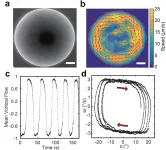Screening for macrocyclic peptides
Dimeric cyclic peptides are potent modulators of ubiquitin, an apoptosis regulator
2021-02-22
(Press-News.org) Macrocyclic peptides are promising candidates for pharmaceuticals, but their screening is difficult. Scientists have now developed an easy-to-use, high-throughput screening assay for cyclic peptides with affinity to ubiquitin, a protein that helps to degrade proteins and induce cell death. The results could lead to novel drug candidates against cancer, according to the study published in the journal Angewandte Chemie.
Drugs based on peptides (small proteins) are often too large to pass through cell membranes. To make such peptides more compact and stable--and thus more efficient--researchers are investigating their closed versions, called macrocyclic peptides. Pharmaceuticals based on macrocyclic peptides are interesting candidates for the modulation of regulatory proteins, which is an important goal in cancer research.
However, screening for such peptides is difficult. "Well-established screening approaches often require highly expensive instrumentation and appropriate training," says Ashram Brik from the Technion-Israel Institute of Technology, Israel, who is set up to develop alternative strategies.
The researchers designed a simple screening assay based on competitive binding. Competitive binding means that unknown peptides are tested for their capabilities to displace a known peptide with known binding affinity to a target. The readout is simply the change in fluorescence, which is provided by the fluorescence label attached to the known peptide. The researchers say that that this setup enables fast, high-throughput, cheap, and easy-to-implement screening of peptide libraries.
The researchers used the assay to screen for peptides binding strongly to ubiquitin, a small cellular protein that cells use to tag dysfunctional proteins and mark them for degradation. They identified several peptide candidates with high binding affinity, which could be further tweaked to make them more functional.
"For example, we subjected the peptides to chemistries such as alkylation arylation, oxidation and dimerization, the first step to make polycyclic peptides," Brik said. "Polycyclic peptides have added value crucial to be considered as drug candidates." Scientists assume that cyclization makes the peptides more stable than their open analogues, and their compact shapes help them to enter cells more easily.
The authors prepared dimers of cyclic ubiquitin-binding peptides, where two identical cyclic peptides are linked, and screened them again for their affinity to ubiquitin. They discovered strongly binding candidates and tested them for their regulatory role in live cancer cell lines. The authors found the dimeric cyclic peptides entered the cells easily and induced cell death, and they were more potent than the control peptide.
In addition, the authors suggest that the novel circular peptides could be labeled and used as staining agents for ubiquitin with antibody-like properties.
INFORMATION:
About the Author
Ashraf Brik holds the Jordan and Irene Tark Academic Chair at the Schulich Faculty of Chemistry at Technion, Israel Institute of Technology, Haifa, Israel. His research involves the development of novel chemistries and approaches to modify proteins for biochemical, biophysical, and biological studies. His group especially designs and synthesizes modulators based on small molecules, peptides, and peptidomimetics for enzymes involved in various diseases.
https://ashrafbrik.technion.ac.il/
ELSE PRESS RELEASES FROM THIS DATE:
2021-02-22
This new finding may pave the way for fabricating a new class of self-driven devices and materials, such as the ability to control the rhythmic movement of soft robots without relying on electronic circuits, and for the study of microbial physiology. It has been published in the scientific journal Nature.
A fast growing and interdisciplinary field, active matter science studies systems consist of units where energy is spent locally to generate mechanical work. Active matter includes all living organisms from cells to animals, biopolymers driven by molecular motors, and synthetic self-propelled materials. Self-organisation (the process of producing ordered structures via interaction between ...
2021-02-22
A SARS-CoV-2 tracker uses publicly available sequencing data to show how the virus is changing and spreading over time. The tracker, called CovMT, was developed at KAUST and is expected to help researchers and policymakers understand the evolution of the virus's mutations. This could have implications for vaccine development, patient treatment and the implementation of restrictions.
"As new variants of the SARS-CoV-2 virus emerge, authorities around the world need to know if these, or similar variants, have entered their countries," says computational biologist, Intikhab Alam, who designed ...
2021-02-22
Treating waste brine using a self-cleaning crystallizer that runs on solar power could be an eco-friendly and efficient way to make seawater desalination more sustainable.
In desert regions, seawater desalination provides essential freshwater for drinking and agriculture. A major problem is that the process generates vast quantities of concentrated brine that is often released into nearby lakes and rivers or back into the sea, harming vegetation and marine life. "With tightening environmental regulations and increasing public awareness, there is pressure to treat brine with zero liquid discharge," says Chenlin Zhang, a Ph.D. student in KAUST. This means extracting every last drop of water while leaving behind solid mineral crystals that can be salvaged for other uses.
Crystallization ...
2021-02-22
Monoclonal antibodies are part of the therapeutic arsenal for eliminating cancer cells. Some make use of the immune system to act and belong to a class of treatment called "immunotherapies." But how do these antibodies function within the tumor? And how can we hope to improve their efficacy? Using innovative in vivo imaging approaches, scientists from the Institut Pasteur and Inserm visualized in real time how anti-CD20 antibodies, used to treat B-cell lymphoma, guide the immune system to attack tumor cells. Their findings were published in the journal Science Advances on February 19, 2021
Anti-CD20 antibodies are used in clinical practice to treat patients with B-cell lymphoma, a type of blood cancer. The treatment, often used in combination with chemotherapy, has been ...
2021-02-22
A mixture of smaller countries led by New Zealand, Vietnam, Taiwan, Thailand, Cyprus, Rwanda and Iceland led the world 's Top 10 countries to manage their COVID-19 response well, according to a new study.
In the study, published in The BMJ, lead researcher Flinders University's Professor Fran Baum joined experts from around the world to reflect upon the Global Health Security Index (October 2019) predictions for a public health emergency.
Along with Australia, Latvia and Sri Lanka among the best responders, the list highlights some of the 10 key causes of why some countries were successful or not in containing COVID-19 pandemic over the past year.
The US, UK, Netherlands, Australia, Canada, Thailand, Sweden, Denmark, South Korea, Finland (France, Slovenia and Switzerland) ...
2021-02-22
People with periodontitis are at higher risk of experiencing major cardiovascular events, according to new research from Forsyth Institute and Harvard University scientists and colleagues.
In a longitudinal study published recently in the Journal of Periodontology, Dr. Thomas
Van Dyke, Senior Member of Staff at Forsyth, Dr. Ahmed Tawakol of Massachusetts General Hospital, and their collaborators showed that inflammation associated with active gum disease was predictive of arterial inflammation, which can cause heart attacks, strokes, and other dangerous manifestations of cardiovascular disease.
For ...
2021-02-22
Despite deaths and hospitalisations linked to many new psychoactive substances (NPS), an international wastewater study led by the University of South Australia shows just how prevalent 'party pills' and 'bath salts' are in different parts of the world.
In a new paper published in Water Research, the world's most comprehensive wastewater analysis of NPS shows the pattern of designer drug use in the 2019/2020 New Year in 14 sites across Australia, New Zealand, China, The Netherlands, Spain, Italy, Norway and the United States.
UniSA analytical chemist Dr Richard Bade says samples were collected over the New Year in each country and ...
2021-02-22
CORVALLIS, Ore. - Oregon State University and U.S. Department of Agriculture researchers have significantly expanded the understanding of the hop genome, a development with important implications for the brewing industry and scientists who study the potential medical benefits of hops.
"This research has the unique ability to impact several different fields," said David Hendrix, an associate professor in the Department of Biochemistry and Biophysics and the School of Electrical Engineering and Computer Science at Oregon State. "If you're talking to beer drinkers, they will be excited about the brewing side. If you are talking to the medical field, they are going to be excited about the pharmaceutical potential."
The findings are outlined in ...
2021-02-22
CORVALLIS, Ore. - Scientists at Oregon State University and the U.S. Forest Service have demonstrated that DNA extracted from water samples from rivers across Oregon and Northern California can be used to estimate genetic diversity of Pacific salmon and trout.
The findings, just published in the journal Molecular Ecology, have important implications for conservation and management of these species, which are threatened by human activities, including those exacerbating climate change.
"There has been a dearth of this kind of data across the Northwest," said Kevin Weitemier, a postdoctoral fellow at Oregon State and lead author of the paper. "This allows us to get a quick snapshot of multiple populations and species all at once."
In addition to demonstrating ...
2021-02-22
CORVALLIS, Ore. - Desert bighorn sheep in the Mojave National Preserve in California and surrounding areas appear to be more resilient than previously thought to a respiratory disease that killed dozens of them and sickened many more in 2013, a new study has found.
Clint Epps, a wildlife biologist at Oregon State University, and several co-authors, found that exposure to one of the bacteria associated with the disease is more widespread among bighorn sheep populations in the Mojave, and that its presence dates further back, than scientists thought. But they also found that the overall number of infected bighorn has declined since 2013 in the populations surveyed.
Epps and his colleagues, including Nicholas Shirkey, an environmental scientist with ...
LAST 30 PRESS RELEASES:
[Press-News.org] Screening for macrocyclic peptides
Dimeric cyclic peptides are potent modulators of ubiquitin, an apoptosis regulator






